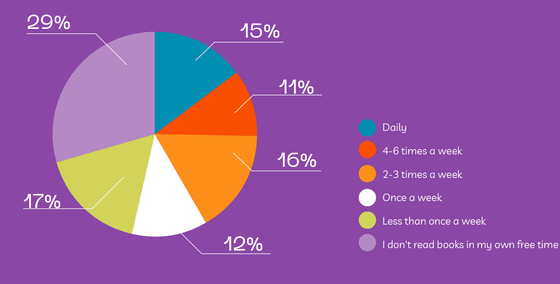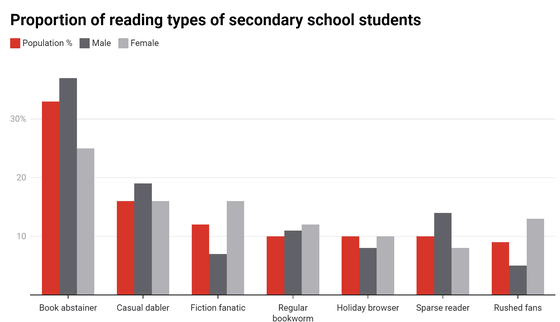How much of a decline in interest in reading among young people is actually occurring, and what can be done about it?

Due to the spread of smartphones and the diversification of hobbies, it is sometimes said that 'the number of young people who do not read books is increasing.' The report 'Teenager Reading in the Digital Age,' published in April 2024, presented the results of a survey on how much teenagers read for leisure and how they can be helped to read more books.
(PDF file) Discovering-a-Good-Read-Survey-Report_FINAL.pdf
From 'Fiction Fanatic' to 'Book Abstainer': Which type of reader are you as a teenager?
https://theconversation.com/from-fiction-fanatic-to-book-abstainer-which-type-of-reader-is-your-teenager-226818

A research team led by Leonie Rutherford, a researcher specializing in the relationship between young people and the media at Deakin University in Australia, surveyed more than 13,000 Australian high school students about their free-time reading habits. The survey was conducted between March 2022 and June 2023.
First, in terms of overall reading habits, 15% of students read every day, 11% read 4-6 times a week, 16% read 2-3 times a week, and 12% read at least once a week. 17% said they read less than once a week, and 29% said they never read. This is somewhat similar to a smaller survey conducted in 2016, where 29% of students said they read less than once a week and 21% said they read less than once a month.

The study went on to look at reading habits outside of books, such as blogs, magazines, and news media. Most high school students surveyed read these media weekly or less frequently, with only 10% saying they read every day. More than a third said they never read. Audiobooks, which allow you to listen to audio recordings of books being read aloud, are also not very popular among young people, with only 13% of students reporting that they have the habit of listening to audiobooks in their free time.
By combining surveys of young people with interviews with publishers, booksellers, language arts teachers and librarians, Rutherford and his team were able to classify teenagers' reading habits into seven types.
・1 Fiction Fanatics
A group of people who are positive about reading and primarily prefer fiction.
・2 Regular Bookworms
I am a very positive reader and read several books a week, mostly fiction, but I also read web news and online articles.
・3 Rushed Fans (I like books but I'm busy)
9% of young people are somewhat open to reading, but don't read every day during term time and mainly read during holidays.
4. Casual Dabblers
This group is not very enthusiastic about reading, reading only 1-3 times a week and not finding much time to read on the weekends.
・5 Holiday Browsers
This group reads infrequently and mainly reads novels or blogs only on their days off. This group comprises about 10% of the population.
6 Sparse Readers
10% are somewhat negative about reading, reading web content almost every week but not many books of any genre.
7 Book Abstainers (Doesn't read books at all)
The group of teenagers who do not read books or short texts in the form of blogs at all accounts for 33%. This differs from the figure given in the Reading Habits Report, which stated that '29% of students answered that they do not read at all,' because the survey results exclude those who did not fill in the answers completely, but the classification includes those who answered to some extent in the analysis.
The graph below shows the seven categories in order of percentage. The red graph shows the percentage of young people overall, the dark gray shows men, and the light gray shows women. Looking at the graph, the most common 'Book Abstainers' group has about 10% more men than women, the second most common 'Casual Dabblers' has slightly more men, but the next 'Fiction Fanatics' and 'Regular Bookworms' have a higher percentage of women than men.

Finally, the report suggests efforts to increase the amount of reading among young people. The researchers believe that reading for leisure has benefits such as improved vocabulary and contextual knowledge, and is associated with better school grades, increased employment opportunities, and mental well-being, and that 'a lack of engagement with reading and books is a problem.' In addition, a paper published in 2012 by a professor of educational research at the University of Bamberg in Germany showed that continuous reading leads to improved literacy, and that it is important to read books of a certain length, rather than short content such as e-mails and blogs.
The main reason why teenagers don't read much is because it's hard to find good books, the researchers said. So if they had access to trained librarians or booksellers knowledgeable about young adult literature to help them identify books they might enjoy, based on genre, theme, or format, Rutherford said young people's reading would increase.
The survey also revealed that many young people, such as those in the 'Rushed Fans' category, are positive about reading but lack the time to do so. For this reason, parents who want their children to read should reduce time pressure on their days off, create a comfortable space for reading at home, and set aside time to read together.
Related Posts:
in Note, Posted by log1e_dh







